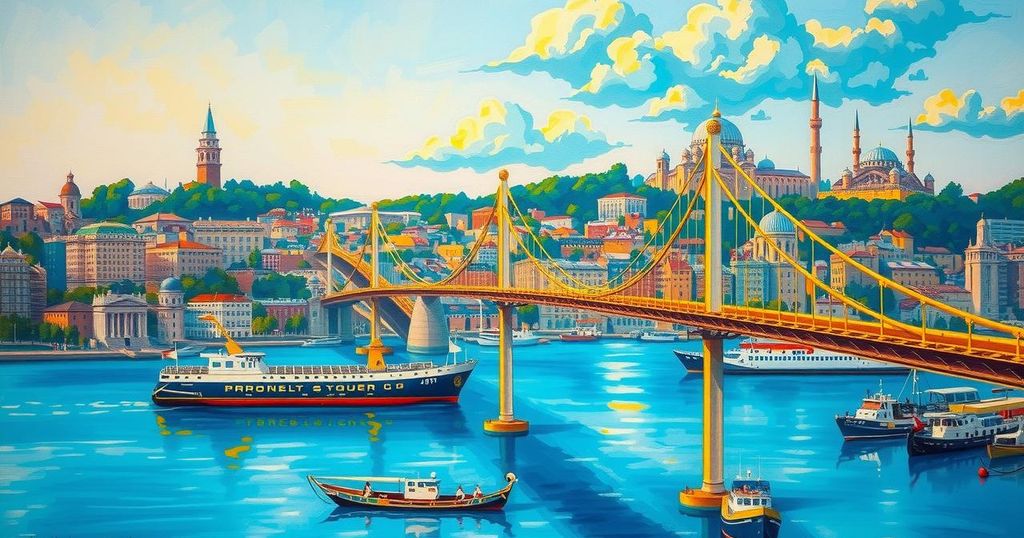Istanbul Talks Showcase Turkiye’s Diplomatic Balancing Act Between Russia and Ukraine

Recent talks in Istanbul showcased Turkiye’s intricate balancing between support for Ukraine and maintaining ties with Russia. Although hopes for a meeting between Putin and Zelenskyy did not come to fruition, delegations from both countries met for the first time since before the war. The negotiations underscore Turkiye’s role as a significant diplomatic player amid ongoing regional conflicts and shifts in alliances.
The recent discussions in Istanbul underscored Turkiye’s precarious balancing act between its relationships with Russia and Ukraine. With the ongoing conflict since 2022, Turkiye has had to juggle its support for Ukraine while simultaneously maintaining its ties with Moscow. Though hopes were high for an in-person meeting between Russian President Vladimir Putin and Ukrainian President Volodymyr Zelenskyy, those plans fell through as Russia confirmed Putin would not attend. However, delegations from both nations were present and agreed upon a prisoner swap, marking a notable moment in direct diplomacy since the war began.
Turkiye’s engagement has heightened its profile as a critical mediator in these significant geopolitical discussions. The Istanbul talks were reminiscent of earlier negotiations hosted by Turkiye, focusing on resolving one of the most impactful conflicts of our time. Besides its diplomatic efforts concerning the war, Turkiye is also expanding its influence in the Middle East and North Africa, seizing opportunities as the US has eased sanctions on the Turkish-aligned Syrian government. Notably, the Kurdistan Workers’ Party (PKK) declared this week that it would disband, concluding a long-standing internal conflict.
Analysts observed that while the direct meeting between Putin and Zelenskyy might have solidified a successful week for Turkiye, the overall diplomatic engagement is a substantial victory for Ankara. According to Ziya Meral from the Royal United Services Institute, “Turkiye stands to win diplomatically whichever way the talks go.” This highlights Turkey’s strategic positioning as a key player in regional geopolitics and its ability to engage with both the United States and Russia.
Omer Ozkizilcik, from The Atlantic Council, emphasized that Turkiye has pioneered a new model of negotiation, moving away from the traditional neutral mediators, like Switzerland, to actively participating in complexities where it holds stakes. He mentioned previous negotiations with Ethiopia and Somalia as part of this approach, portraying Turkiye as a competent mediator in various conflicts through the region, even as it supplies drones and military aid to Ukraine and maintains collaborations with Russia.
Indeed, Turkiye’s relationship with Russia has fluctuated over the years, exhibiting both tensions and cooperation. Early in the war, Turkiye classified Russia’s invasion as a “war,” activating the Montreux Convention which restricted the movement of Russian warships in the Black Sea. The two nations have been on opposing sides in other conflicts like Libya and Syria, and a significant flashpoint occurred in 2015 when Turkiye shot down a Russian jet. Although relations soured initially, a statement of regret from Ankara helped restore ties, showcasing that diplomacy can often withstand significant challenges.
The complexities deepen with Turkiye still supplying military aid to Ukraine. Interesting enough, Russia appears to have largely overlooked this support, likely due to the broader benefits that come from maintaining strong economic, diplomatic, and energy relations with Turkiye. In fact, Turkiye’s presence in NATO has conferred a degree of utility to its partnership with Russia, allowing for continued dialogue.
Meanwhile, relations with Ukraine have strengthened, particularly in the backdrop of Turkiye’s strategic role in facilitating Ukrainian grain shipments in 2022. Ukrainian President Zelenskyy has expressed gratitude toward Erdogan for his support and diplomatic efforts, which underscores the importance of their partnership. Zelenskyy noted that maintaining dialogue, even in Putin’s absence at the Istanbul talks, reflects respect for Turkiye’s leadership.
The intricate dynamics of Turkiye’s diplomacy illustrate the nation’s ambitions to elevate its status both regionally and globally. Steven Horrell of the Center for European Policy Analysis pointed out that jika successful, the talks would bolster Turkiye’s prestige on the international stage. They perceive themselves not just as a regional leader, but rather as essential players in global peace negotiations, enriching their relations with both Russia and Ukraine.
In summary, Turkiye’s recent talks in Istanbul exemplify its delicate balancing act between Russia and Ukraine amidst a complex geopolitical landscape. Turkiye’s role as a mediator highlights its expanding influence and commitment to fostering dialogue. The engagement with both nations underscores its ambition to be recognized as a serious diplomatic player on the global stage. Stable relations with both Ukraine and Russia could yield significant diplomatic advantages for Turkiye as it navigates these conflicting interests.
Original Source: www.aljazeera.com







